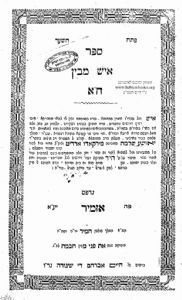A Short Tribute
Hacham Joshua Solomon Erdit was born to Hannah and Haim Nissim Yaakov in 1789 in Izmir, Turkey.
His father, who was a merchant, supported him so that he could devote his entire efforts to Torah study. In 1841, financial hardship forced the sages of Izmir to interrupt their fulltime study. He entered the world of commerce as did other sages of his day, including Hacham Binyamin Pontarimoli, author of Petakh HaDevir.
Hacham Joshua Solomon Erdit lived a long life, had several children, and enjoyed the privilege of knowing his grandchildren. His eldest son, Hacham Raphael Yaakov and his son Hacham Moshe died during his lifetime; his son Hacham Yitzchak outlived him. During his lifetime he was subject to great suffering, suffered from a life-threatening disease, yet was healed and survived.
Hacham Joshua Solomon Erdit (Mirkado) passed away on 5 Sivan, 1876.
Hacham Joshua Solomon Erdit (Mirkado) was able to have the first volume of his book, Khina VeKhisda, on Tractate Ketubot, published in 1864; the second volume was published in 1874. The third volume of his book Khina VeKhisda was published after his decease, in 1877. The first volume of Ish Mevin, book of his sermons, as published in 1889 and the second in 1905. The manuscript of his work on Maimonides’ HaYad HaHazaka, has apparently been lost.
